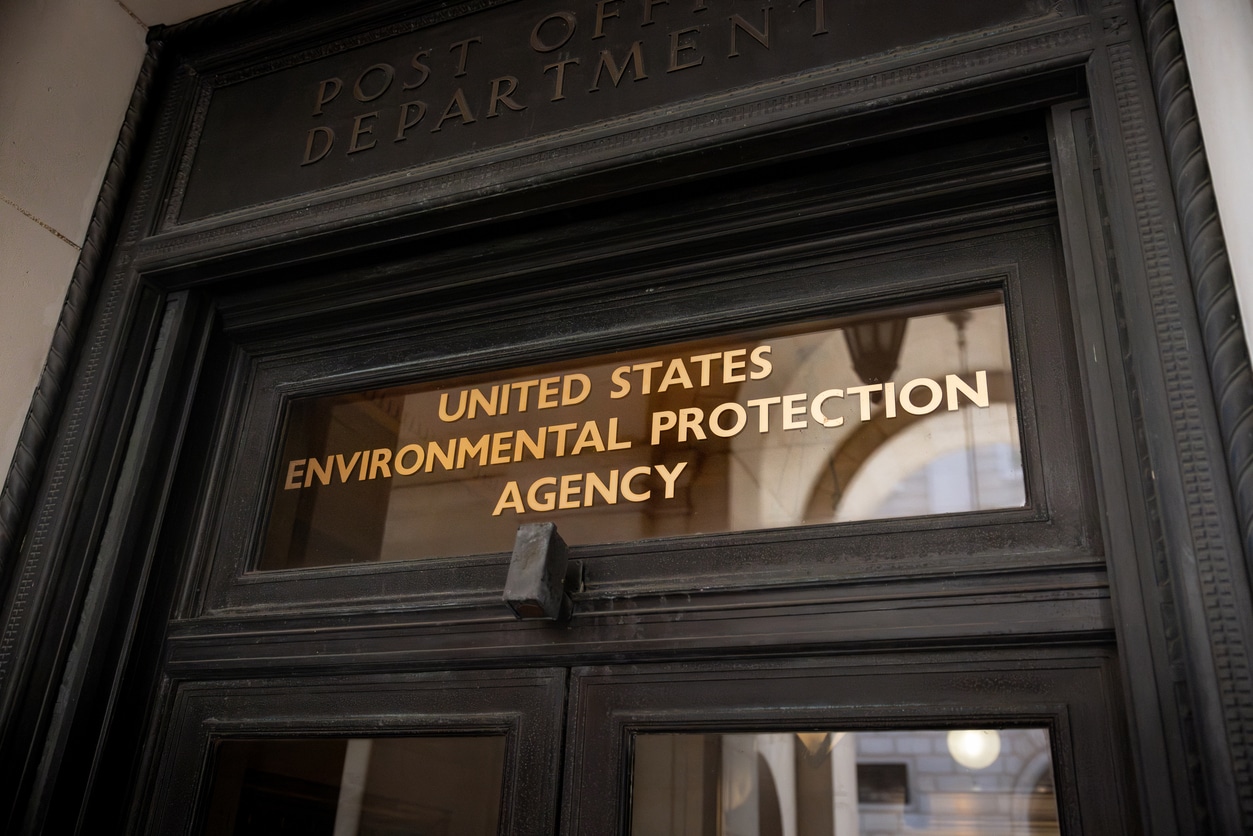Editor’s Note: On March 18, a judge temporarily blocked the EPA from clawing back funds from Climate United, the Coalition for Green Capital, and Power Forward Communities. But, according to Politico, the order, “does not immediately restore access to the groups’ accounts, nor does it officially kill EPA’s right to press for contract terminations in the future.”
The Environmental Protection Agency says it’s officially canceling $20 billion in Biden-era climate funding that was awarded to several nonprofits.
Earlier this week, the agency announced it would “re-obligate” the funds “with enhanced controls to ensure adequate governance, transparency, and accountability.” The administration has alleged that the funds were mismanaged and issued with political bias, but so far hasn’t produced the evidence needed to legally block the funds.
The Department of Justice, the FBI, and the EPA’s acting inspector general are investigating.
The funding is part of the Inflation Reduction Act’s Greenhouse Gas Reduction Fund (GGRF), which was formally awarded by the EPA last summer when President Joe Biden was in office. The eight nonprofit grantees selected were responsible for redistributing the funds to green projects and groups that primarily serve low-income and disadvantaged communities. The GGRF was also expected to benefit the affordable housing stock, including addressing deferred maintenance and developing new housing.
“This arbitrary action by the EPA impacts the planned announcement of over $228 million in initial awards to 26 organizations that would have financed housing, distributed energy, and transportation infrastructure projects in more than 30 states, and created or retained an estimated 5,000 jobs,” stated the Opportunity Finance Network (OFN), one of the grantees, in a March 13 statement. OFN, a network of over 400 community development financial institutions operating across the country, said the decision to cancel the grants was “based on inaccurate and politicized claims” that “undermine a critical effort to drive American energy independence, local resilience, and job creation in communities.”
About $4 billion in GGRF funds have already been awarded for local projects that are being planned, are currently underway, or complete, says Adam Kent, director of blended and inclusive finance at the National Resources Defense Council, an environmental advocacy organization. The grantees have signed contracts that they’re required to follow, and committed to work plans they must fulfill, says Kent.
Climate United—one of the grantees—says it has already committed hundreds of millions to projects across the U.S., some that would help families decrease energy bills and make clean energy investments to their homes, and others that would help develop and preserve affordable housing. Last weekend, on March 8, it filed suit against the EPA and Citibank—the external financial institution where the funds were held—for freezing the accounts. Soon after, two other awardees sued the bank: The Coalition for Green Capital, an organization that develops green banks, and Power Forward Communities, a coalition of several large community development nonprofits.
The EPA canceled the grants just one day before a hearing was set to take place in the Climate United Fund’s suit.
How Trump’s executive orders are targeting environmental justice
On his first day as president, Donald Trump issued several executive orders targeting previous administrations’ climate efforts—particularly Biden’s. One executive order rescinded a Biden-era commitment to take on environmental justice. Often abbreviated as “EJ”, the environmental justice movement confronts environmental harms with consideration of how their impacts are felt differently depending on factors like race and income.
Another executive order denigrated diversity, equity, inclusion, and accessibility initiatives as discriminatory. Trump included environmental justice with these targeted terms and moved to remove all related programs, positions, and grants. (Shelterforce explored the “DEI” order’s potential impacts and spoke to affected organizations here.)
A third order took aim at the Inflation Reduction Act and Infrastructure Investment and Jobs Act, instructing agencies to “immediately pause the disbursement of funds” issued through the two massive investments, pending a review.
The EPA’s recent move follows a series of actions since Donald Trump’s inauguration to prevent the climate-related funding from rolling out as legally required. The GGRF accounts have been frozen since mid-February, about a week after Lee Zeldin—the EPA’s current administrator—called on Citibank to immediately return the funds to the Treasury. Along with the agency’s concern about political bias and undeserving grant recipients, the EPA believes Citibank’s role as an external financial institution storing the funds was “unprecedented.”
“The days of irresponsibly shoveling boatloads of cash to far-left activist groups in the name of environmental justice and climate equity are over,” Zeldin said.
When contacted in February following Zeldin’s announcement that he would withdraw the GGRF awards, an EPA spokesperson told Shelterforce that the agency “worked expeditiously to enable payment accounts for [Infrastructure Investment and Jobs Act] and [Inflation Reduction Act] grant recipients, so funding is now accessible to all recipients.”
The agency did not respond to our second request for comment about grantees losing access to their accounts at Citibank. Citibank did not respond to our request for comment, but according to court documents uploaded by TechCrunch, the EPA, Treasury, and the FBI told the bank to pause the funds. [One federal prosecutor who refused to order Citibank to freeze the accounts due to insufficient evidence resigned in response.]
[RELATED SERIES—Dual Crises: Housing in a Changing Climate]
Other nonprofit groups that were awarded GGRF funding include the Native CDFI Network, a national network of 69-plus Native community development financial institutions; and Appalachian Community Capital, a lending intermediary serving the Appalachian region. [Learn more about the grantees and the various funding mechanisms for the Greenhouse Gas Reduction Fund].
Shelterforce reached out to the grantees but did not receive a response before publication.
So, do the administration’s claims hold water?
According to EPA experts, no. The process by which the funds were developed and awarded was open and rigorous, according to Kent of the National Resources Defense Council. And although the Inflation Reduction Act was unpopular among Republicans in Congress (it passed neatly on party lines), the funds are actually supposed to benefit more red-leaning areas than blue ones.
“The process was very public. It was multi-year. It was a very competitive application, like 70-plus pages,” says Kent. “Everything was done by statute, too.”
As for whether storing the funds with Citibank was “unprecedented,” Kent says, “It has been done before, but not by EPA.” The Greenhouse Gas Reduction Fund was held in a financial institution because the Biden administration intended for it to raise private investment, Kent says. They anticipated that every $1 spent would raise another $7 from the private sector.
Similar arrangements are the norm for the Treasury, according to Zealan Hoover, former senior adviser to the EPA administrator and implementation manager. “EPA worked with the Department of the Treasury, which has a long history going back to the 1800s of contracting with private banks to serve as financial agents. This is a very common arrangement that has been used to move hundreds of billions of dollars,” said Hoover on an Environmental Protection Network press call in February.
Before Trump was inaugurated, Shelterforce hosted a webinar about the Greenhouse Gas Reduction Fund where many registrants asked the same question: would a change of administration affect the rollout of the funds? The answer was no—at least, not legally, and not without evidence of fraud.
“Since it has been obligated and the funding has been disbursed to a fiscal agent, it cannot be clawed back without cause,” said panelist Mary Scott Balys, senior vice president of public policy at OFN. “Obviously if an organization were to violate the terms and conditions of the agreement or some other fraud or abuse or something like that, money could be clawed back by the federal government, but it could not just be rescinded,” she said.
Experts say that the real motivation behind EPA’s claims of mismanaged funds is freeing them up for other uses.
“The real story is that they’re not doing this for fraud and waste. They’re doing this to have $20 billion to pay for their tax break. That’s the tax break that’s going to go to corporations and billionaires,” said Jillian Blanchard, vice president of climate change and environmental justice at Lawyers for Good Government, during the press call with the Environmental Protection Network.





Comments